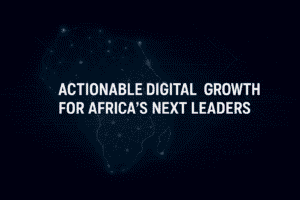Introduction:
Africa is at a crossroads. For decades, the continent’s story has too often been framed around its challenges poverty, inequality, limited access to healthcare and education, unemployment, and the looming threat of climate change. While these realities cannot be ignored, they tell only half the story. The other half is far more exciting: Africa is home to the world’s youngest and most dynamic population, rapidly growing cities, expanding internet access, and a flourishing ecosystem of entrepreneurs and innovators who are determined to rewrite the continent’s narrative.
What makes this moment so pivotal is the role of digital solutions. Technology is no longer an optional luxury; it has become a vital instrument for progress. Across the continent, digital tools are helping to solve problems that once seemed insurmountable. Mobile banking has brought financial services to millions of unbanked citizens. Telemedicine and health apps are connecting rural communities to doctors and essential health information. E-learning platforms are breaking barriers to education, allowing children and adults in underserved areas to learn, upskill, and compete in a digital economy. Farmers are using mobile apps to access market prices and weather forecasts, while governance platforms are opening new pathways for transparency and accountability.
The untapped potential of these solutions is immense. Yet, realizing it requires more than just access to technology it demands leadership, vision, and a strategic approach to implementation. Digital transformation in Africa must be intentional, inclusive, and sustainable. This means empowering leaders to articulate a digital vision, building the infrastructure to support innovation, fostering digital literacy across communities, and creating policies that encourage growth while protecting citizens.
In this blog, we explore the areas where digital solutions can make the greatest social impact—from education and healthcare to agriculture, financial inclusion, and governance. We also highlight what it will take for African leaders to harness this potential effectively: investing in infrastructure, promoting digital literacy, fostering partnerships, and ensuring long-term sustainability.
At Valuegate Consulting, we believe Africa stands at the threshold of a digital revolution. The question is not whether technology can transform the continent it already is but how leaders can scale these solutions in ways that create real, lasting impact. This post is a call to rethink technology as more than a tool it is the bridge between Africa’s challenges and its brightest opportunities.
The Untapped Potential of Digital Solutions in Africa
Africa faces a unique set of challenges, including poverty, inequality, limited access to healthcare and education, and vulnerability to climate change. However, the continent also possesses immense potential, driven by a young and dynamic population, increasing internet penetration, and a growing tech ecosystem. Technology offers a powerful toolkit for addressing these challenges and unlocking Africa’s potential.
Here are some key areas where digital solutions can drive social impact:
- Education: Online learning platforms, digital libraries, and mobile learning apps can expand access to quality education, particularly in remote and underserved areas. Technology can also personalize learning experiences, track student progress, and provide valuable data for educators.
- Healthcare: Telemedicine, mobile health (mHealth) apps, and electronic health records can improve access to healthcare services, especially in rural communities. Digital tools can also facilitate disease surveillance, track outbreaks, and promote preventative care.
- Agriculture: Precision agriculture techniques, mobile apps for farmers, and online marketplaces can enhance agricultural productivity, improve food security, and connect farmers to markets. Technology can also provide farmers with access to weather information, market prices, and best practices.
- Financial Inclusion: Mobile banking, digital wallets, and microfinance platforms can expand access to financial services for the unbanked and underbanked populations. Technology can also facilitate remittances, promote entrepreneurship, and empower individuals to manage their finances effectively.
- Governance and Transparency: E-governance platforms, online citizen engagement tools, and open data initiatives can promote transparency, accountability, and citizen participation in government. Technology can also help combat corruption, improve service delivery, and strengthen democratic institutions.

Empowering Leaders to Leverage Technology Effectively
To harness the full potential of technology for social impact, African leaders must adopt a strategic and proactive approach. This includes:
- Developing a Digital Vision: Leaders must articulate a clear vision for how technology can contribute to their development goals and priorities. This vision should be aligned with national development strategies and reflect the specific needs and opportunities of their communities.
- Investing in Digital Infrastructure: Governments must invest in building robust digital infrastructure, including broadband networks, data centers, and cybersecurity systems. This infrastructure is essential for supporting the deployment and adoption of digital solutions.
- Promoting Digital Literacy: Leaders must prioritize digital literacy programs to equip citizens with the skills and knowledge they need to participate in the digital economy. This includes basic computer skills, internet safety, and digital entrepreneurship training.
- Creating an Enabling Regulatory Environment: Governments must create a regulatory environment that fosters innovation, encourages investment, and protects consumers. This includes policies related to data privacy, cybersecurity, and intellectual property.
Fostering Collaboration and Partnerships: Leaders must foster collaboration between government, the private sector, civil society, and academia to develop and implement digital solutions. This includes creating platforms for dialogue, sharing best practices, and co-creating innovative solutions.

The Importance of Strategic Partnerships and Sustainable Implementation
The successful implementation of digital solutions requires strategic partnerships and a focus on sustainability. This includes:
- Public-Private Partnerships (PPPs): PPPs can leverage the expertise and resources of the private sector to develop and implement digital solutions. Governments can provide the policy framework and regulatory oversight, while the private sector can bring innovation, technology, and investment.
- Collaboration with Civil Society Organizations (CSOs): CSOs play a crucial role in reaching marginalized communities, advocating for citizen rights, and monitoring the impact of digital solutions. Governments should engage with CSOs to ensure that digital initiatives are inclusive, equitable, and responsive to the needs of the people.
- Partnerships with Academia and Research Institutions: Universities and research institutions can provide valuable expertise in technology, data analysis, and impact assessment. Governments should support research and development in digital technologies and encourage collaboration between academia and the private sector.
Focus on Sustainability: Digital solutions should be designed to be sustainable in the long term. This includes ensuring that they are financially viable, environmentally friendly, and socially responsible. Governments should also invest in building local capacity to maintain and update digital systems.

The Importance of Strategic Partnerships and Sustainable Implementation
The successful implementation of digital solutions requires strategic partnerships and a focus on sustainability. This includes:
- Public-Private Partnerships (PPPs): PPPs can leverage the expertise and resources of the private sector to develop and implement digital solutions. Governments can provide the policy framework and regulatory oversight, while the private sector can bring innovation, technology, and investment.
- Collaboration with Civil Society Organizations (CSOs): CSOs play a crucial role in reaching marginalized communities, advocating for citizen rights, and monitoring the impact of digital solutions. Governments should engage with CSOs to ensure that digital initiatives are inclusive, equitable, and responsive to the needs of the people.
- Partnerships with Academia and Research Institutions: Universities and research institutions can provide valuable expertise in technology, data analysis, and impact assessment. Governments should support research and development in digital technologies and encourage collaboration between academia and the private sector.
- Focus on Sustainability: Digital solutions should be designed to be sustainable in the long term. This includes ensuring that they are financially viable, environmentally friendly, and socially responsible. Governments should also invest in building local capacity to maintain and update digital systems.
Conclusion
Africa’s future will not be defined by its challenges, but by how it chooses to respond to them. Digital solutions have already proven their ability to bridge gaps, open new opportunities, and empower communities but the journey has only just begun. Education platforms are helping students learn beyond the walls of a classroom, telemedicine is connecting patients to doctors across great distances, and fintech innovations are rewriting the rules of financial inclusion. Each of these examples is more than a success story they are reminders of what is possible when technology is aligned with vision and purpose.
Still, the real transformation lies ahead. To fully unlock this potential, Africa’s leaders must move beyond experimenting with digital tools to adopting them as strategic drivers of development. This means creating digital visions that align with national and community goals, investing in infrastructure that supports innovation, and ensuring digital literacy is not reserved for a few, but accessible to all. It also means building ecosystems of collaboration between governments, businesses, civil society, and academia where solutions are co-created, tested, and scaled in ways that are inclusive and sustainable.
Technology, on its own, cannot solve Africa’s challenges. But in the hands of bold and forward-thinking leaders, it becomes a catalyst for impact, growth, and transformation. The leaders who embrace this reality those who see digital tools as more than conveniences but as enablers of equity and opportunity will shape the Africa of tomorrow.
At Valuegate Consulting, we believe this future is within reach. Our role is to walk alongside Africa’s next generation of leaders, entrepreneurs, and changemakers helping them design digital strategies, implement effective solutions, and build the capacity to sustain growth. We are committed to ensuring that Africa does not just adopt technology, but that it owns its digital transformation journey.
The untapped potential of digital solutions is waiting. The time to act is now.
A Call to Action
Technology gives African leaders the opportunity to do more than respond to challenges it allows them to redesign the future. By embracing digital innovation, investing in infrastructure, promoting literacy, and building partnerships, Africa can unlock its untapped potential and create a more inclusive, resilient, and prosperous continent.
AtValuegate Consulting, we are committed to supporting African leaders in this journey. From digital strategy development to technology implementation and capacity building, we help leaders and organizations leverage digital tools to create measurable social impact.
Partner with us now. Mentor a rising innovator, Support youth-led ideas that change lives and Together, we’re not just talking about change-we’re building it.
Send Us An Email: info@valuegate.com.
Follow Us On LinkedIn Today.
Follow Us On Facebook Today.
Partner With Us to support youth-led initiatives across Africa.




